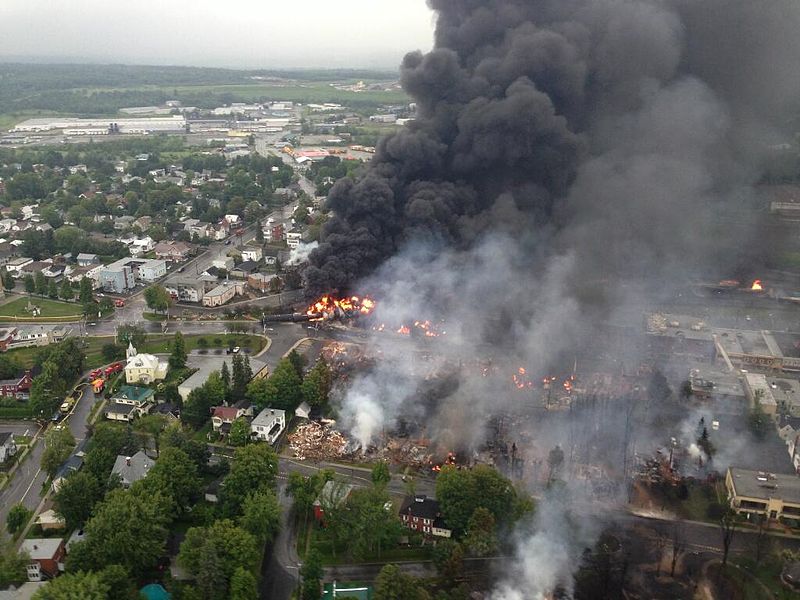How easy it would be to lay the blame for the tragedy in Lac-Mégantic on the engineer who ran the train. But the real responsibility lies with the governments on both sides of the border who have deregulated their transport sectors, gutted freshwater protections and promoted the spectacular growth and transport of new and unsustainable fossil fuels.
Starting back in the 1970s, the US government deregulated rail transport, allowing deep staff reductions, the removal of brakemen from trains and lower safety standards for shipping hazardous materials. Canadian governments followed suit and allowed the railways to self-regulate safety standards and continue to ship oil in the older, accident-prone tanker cars of the kind that crashed into Lac-Mégantic.
Just last year, Transport Canada gave Montreal, Maine and Atlantic Railways the green light to run each train with just one engineer, which explains how one man came to be in charge of 72 cars and five locomotives carrying combustible energy through inhabited communities.
The Harper government, meanwhile, has gutted environmental regulation and freshwater protection in order to speed up the development of the Alberta tar sands.
Its victims include the Fisheries Act, the Navigable Waters Protection Act and the whole environmental assessment process. Ninety-nine percent of all lakes and rivers in Canada, including Lac-Mégantic, are no longer protected from pipelines carrying bitumen or fracked oils near, around or under them.
The Quebec government estimates that at least 5.6 million litres of crude oil has escaped into the environment.
Both the American and Canadian governments have chosen to subsidize and promote the production of fracked oil and gas as well as heavy oil from tar sands operations over conservation and alternative, renewable sources of energy. The tankers that slammed into Lac-Mégantic were carrying shale oil from the Bakken fields in North Dakota, a deposit being mercilessly mined, as are many other sites across North America, in spite of their direct threat to local water supplies and human health.
The energy industry has plans to increase production in the Alberta tar sands five-fold, and is now shipping raw, unrefined bitumen, diluted with heavy chemicals, across the continent, by pipeline, railcar tankers and on ships on the Great Lakes. Shipments of oil by rail have increased by 28,000 per cent since 2009 and barges and ships carry almost 4 million tons of oil and petroleum products (about 4 billion litres) to or from U.S. Great Lakes ports every year and more between Canadian ports.
Some are using this tragic rail accident as an argument in favour of the controversial oil pipelines. But pipelines also pose a serious threat to human health and the environment when they carry hazardous materials. The International Energy Agency says that pipelines spill far more oil than rail.
On average, in Alberta alone there are an average of two spills every day — over 770 spills every year. The danger of increased shipments of tar sands oil across the Great Lakes cannot be exaggerated.
The combination of a dramatic increase in North American fossil fuel production combined with deregulation of modes of oil and gas transportation and the removal of almost all protections for Canada’s freshwater heritage is a recipe for further accidents, spills and tragedies. Those who do not learn from their mistakes are bound to repeat them.
All across the country, we are in mourning for the victims of this accident. The very least we can do for the families and friends of lost loved ones in Lac-Mégantic is right the wrongs that led to that terrible night.
Photo: wikipedia commons



